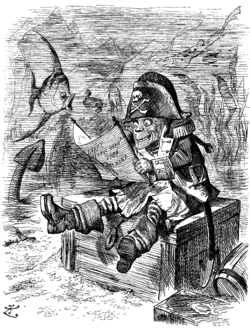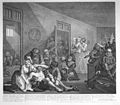Portal:Cartoon
The Cartoon Portal

A cartoon is a type of visual art that is typically drawn, frequently animated, in an unrealistic or semi-realistic style. The specific meaning has evolved, but the modern usage usually refers to either: an image or series of images intended for satire, caricature, or humor; or a motion picture that relies on a sequence of illustrations for its animation. Someone who creates cartoons in the first sense is called a cartoonist, and in the second sense they are usually called an animator.
The concept originated in the Middle Ages, and first described a preparatory drawing for a piece of art, such as a painting, fresco, tapestry, or stained glass window. In the 19th century, beginning in Punch magazine in 1843, cartoon came to refer – ironically at first – to humorous artworks in magazines and newspapers. Then it also was used for political cartoons and comic strips. When the medium developed, in the early 20th century, it began to refer to animated films that resembled print cartoons. (Full article...)

In print media, a cartoon is a drawing or series of drawings, usually humorous in intent. This usage dates from 1843, when Punch magazine applied the term to satirical drawings in its pages,[1] particularly sketches by John Leech.[2] The first of these parodied the preparatory cartoons for grand historical frescoes in the then-new Palace of Westminster in London.[3]

Sir John Tenniel—illustrator of Alice's Adventures in Wonderland—joined Punch in 1850, and over 50 years contributed over two thousand cartoons.[4]
Selected article -
Avatar: The Last Airbender is an American animated television series that aired for three seasons on Nickelodeon from 2005 to 2008. The series was created and produced by Michael Dante DiMartino and Bryan Konietzko, who served as executive producers along with Aaron Ehasz. Avatar is set in an Asian-influenced world of Chinese martial arts and elemental manipulation. The series follows the adventures of the main protagonist Aang and his friends, who must save the world by defeating the evil Fire Lord and ending the destructive war with the Fire Nation. Avatar: The Last Airbender was popular with both audiences and critics, Avatar has been nominated for and won awards from the Annual Annie Awards, the Genesis Awards, the primetime Emmy awards and a Peabody Award among others. In other media, the series has spawned a live-action movie trilogy, the first titled The Last Airbender, directed by M. Night Shyamalan, scaled action figures, a trading card game, second, and third seasons, stuffed animals distributed by Paramount Parks, and two LEGO sets.
Selected character -
Anarky is a fictional character in the DC Comics Universe. Co-created by Alan Grant and Norm Breyfogle, he first appeared in Detective Comics #608 (November 1989) as an adversary of Batman. Stories revolving around Anarky often focus on political and philosophical themes. Named after the philosophy of anarchism, the primary philosophical element that has underscored the character's appearances has been anti-statism. With Grant's transition to the philosophy of Neo-Tech, Anarky was transformed from a vehicle for socialist and populist philosophy, to rationalist, atheist, and free market based thought. Inspired by multiple sources, early stories to feature the character often included homages to political and philosophical books. The creation of the character was also partially influenced by Alan Moore's character "V" from V for Vendetta. Originally intended to only be used in the debut story in which he appeared, positive reception by readers and his editor convinced Grant to continue using Anarky as a recurring character throughout the early 90s. This popular acclaim culminated, however, in a financially and critically unsuccessful ongoing solo series. The 1999 Anarky series, in which even Alan Grant has expressed his distaste, was quickly canceled after eight issues.
Did you know... -
- ...that publication of comics in Hungary largely stopped during World War II due to Nazi pressure?
- ...that the Young Justice episode "Independence Day" introduces a younger version of the DC Universe?
- ...that the Sam Sheepdog and Ralph Wolf cartoons Sheep Ahoy, A Sheep in the Deep, and Don't Give Up the Sheep were censored by ABC to remove a dynamite stick, a smoke break scene, and a spanking scene respectively?
- ...that The World of Strawberry Shortcake, the first television special to feature American Greetings' popular character, was rejected by the major U.S. networks and premiered in syndication instead?
Selected list -
There have been 131 episodes of Ed, Edd n Eddy, an animated comedy television series created by Danny Antonucci and produced by Canada-based a.k.a. Cartoon. The series debuted on Cartoon Network in the United States on January 4, 1999, and ended on November 8, 2009, with the premiere of the series finale film Ed, Edd n Eddy's Big Picture Show. The series was originally planned to air for four seasons; however, Cartoon Network ordered two additional seasons and three holiday-themed specials as a result of its popularity. Reruns continue to air on Cartoon Network, including airing as part of the revived block Cartoon Planet. The series revolves around three adolescent boys collectively known as "the Eds", who live in a suburban cul-de-sac. Unofficially led by Eddy, the Eds constantly try to scam the fellow cul-de-sac children in order to purchase jawbreakers. The Eds' plans usually fail and leave them in various predicaments. The award-winning series garnered generally positive reviews, and remains the longest running original Cartoon Network series and Canadian-made animated series to date.
General images -
Selected biography -
Julie Kavner (born September 7, 1950) is an American film and television actress, comedian and voice artist. Noted for her role as Marge Simpson on the animated television series The Simpsons, she also voices other characters for the show, including Patty and Selma Bouvier. Born in Los Angeles, Kavner grew up in Southern California, attending Beverly Hills High School and later San Diego State University. Known for her improvisation and distinctive "honeyed gravel voice," Kavner was cast in her first professional acting role as Brenda Morgenstern in Rhoda in 1974. She received a Supporting Actress in a Comedy Series Primetime Emmy Award in 1978 and several more award nominations for playing the character. Following Rhoda, Kavner was cast in The Tracey Ullman Show, which debuted in 1987. The Tracey Ullman Show included a series of animated shorts about a dysfunctional family. Voices were needed for the shorts, so the producers decided to ask Kavner to voice Marge. The shorts would eventually be spun off into The Simpsons.
Subcategories
WikiProjects
- Main projects
- Arts • Animation • Comics • Entertainment • Visual arts
- Related Projects
- Anime and manga • Biography • Film • Fictional characters • Media franchises • Music • Television • Video games
Selected quote -
Topics
- Comic book
- Comic strip
- Digital comics
- Graphic novel
- Mobile comic
- Motion comics
- Trade paperback
- Webcomic
- Animator
- Animation director
- Animation studios
- Animation film festivals
- Feature-length films
- Short films
- Television series
- Computer-animated films
- Stop-motion films
- Traditional animation
- Limited animation
- Rotoscoping
- Stop Motion
- Clay
- Cutout
- Graphic
- Model
- Object
- Pixilation
- Puppetoon
- Computer animation
- Flash animation
- PowerPoint animation
- SVG animation
- Cel-shaded animation
- Crowd simulation
- Morph target animation
- Motion capture
- Non-photorealistic rendering
- Skeletal animation
Things you can do

- Requested articles: Fenwick (comics), Khimaera (comics), Mutant Underground Support Engine, Bruce J. Hawker, Marc Dacier, Hultrasson, Frankenstein Comics, Dave Johnson (comics), Paco Medina, Dappere Dodo, New Adventures of the Space Explorers, Habatales, Musical Box, Foo-Foo (TV series), Bonne nuit les petits, The Adventures of Lariat Sam, More...
- Images and photos needed: Request images that are needed from Wikipedia requested images of comics and animation to included in each articles.
- Stubs: Work on stubs in articles in Comics and Animation stubs.
- Infobox: Add infobox that are needed from Category:Comics articles without infoboxes and Category:Animation articles needing infoboxes in articles.
- Deletion sorting: Please see the collection of discussions on the deletion of articles related to comics and animation - compiled by WikiProject Deletion sorting
Related portals
Associated Wikimedia
The following Wikimedia Foundation sister projects provide more on this subject:
-
Commons
Free media repository -
Wikibooks
Free textbooks and manuals -
Wikidata
Free knowledge base -
Wikinews
Free-content news -
Wikiquote
Collection of quotations -
Wikisource
Free-content library -
Wikiversity
Free learning tools -
Wiktionary
Dictionary and thesaurus
More portals
Sources
- ^ Punch.co.uk. "History of the Cartoon". Archived from the original on 2007-11-11. Retrieved 2007-11-01.
- ^ Adler & Hill 2008, p. 30.
- ^ "Substance and Shadow: Original Editorial Accompanying "Cartoon, No. I"". Victorian web.org. Retrieved 29 October 2023.
- ^ "Sir John Tenniel". National Portrait Gallery. Retrieved 26 August 2022.






































